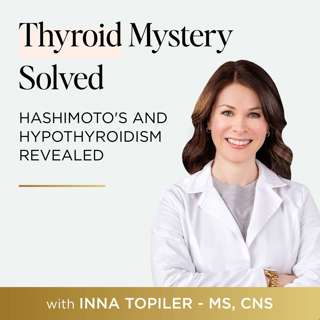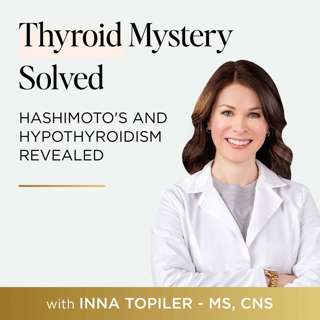
117 Busting the Biggest Myths about Mold and Mycotoxins with Guest Jason Earle(Part 1)
The Case: Allison was dealing with brain fog, fatigue, and joint pain.She felt much older than her chronological years.Labs showed that her B vitamins, iron, and thyroid were all fine but her symptoms persisted. The InvestigationWhen I met Allison, I decided to check her thyroid again but everything really was normal. We talked about a lot of other possible root causes but when she told me that things had gotten worse after she moved to her new house, I started to suspect that her issues may have something to do with her environment. It was time to see if there was mold in her house. Indoor Air Quality Crusader and Mold ExpertJason Earle is the founder and CEO of 1-800-Got-Mold as well as the creator of the Got Mold Test Kit. He’s appeared as an expert on The Dr. Oz Show, Good Morning America, and Extreme Home Makeover. Jason is passionate about mold because his childhood in a moldy farmhouse resulted in several health issues for him. What is Mold?Jason explains that mold is, on a very basic level, the beginning of decay. This decay, which is nature’s way of breaking things down, causes a smell that serves as a warning sign to humans. Some people are more sensitive to molds and therefore find it easier to smell mold when it’s in the air or the environment. Mold sends you a signal that the air is not healthy and you want to heed that warning because mold problems just get worse if they are not dealt with. Unhealthy Building or HouseMoisture is the enemy of a healthy building. Mold is a natural byproduct of prolonged dampness. Plus, mold spores become airborne and are constantly looking for the right conditions to take hold, germinate, and form mold. Spores can cause allergic reactions including sinus issues, dermal reactions, and itchy eyes. These spores also carry a by-product of mold called mycotoxins. And, mold produces a musty smell known as microbial volatile organic compounds (MVOCs). The Dangers of Microbial Volatile Organic Compounds (MVOCs)MVOCs can make people very sick. Research shows that living in a home with ‘musty odor’ increases the risk of asthma in children by 250%. Additional research, being done by Dr. Joan Bennett at Rutgers University is looking at the link between musky odor and reduced dopamine production. Such a connection could lead to potential links to Parkinson-like symptoms, depression, and cognitive issues. Testing for MoldThere are different types of tests available but they aren’t all created equal. Jason doesn’t think the ‘petri dish’ tests are very accurate because petri dishes are made to grow mold. He says that spores are everywhere so the presence of spores doesn’t mean there is mold. He does sell his own version of testing kits called Got Mold Testing Kits. You can also hire a mold inspector but he also warns against expensive inspectors who may capitalize on the presence of mycotoxins and then charge thousands to treat it without removing the source of the mold. It’s important to note that there are two kinds of mold problems - the kind you can see and the kinds you can’t (sequestered) because it’s hidden in the walls or ceilings. When inspecting a house, it’s important to look for both kinds of mold. Jason has a free ebook called “How to Find Mold in Your Home” that you can access at https://www.gotmold.com/mysteriessolved/ Finding a Professional Mold InspectorHiring a trustworthy inspector to detect mold in the house is important. Jason warns against hiring anyone who may be associated with a remediation company as there may be a conflict. The free guide his company created (downloadable) includes questions you should ask a potential inspector. Mold RemediationJason’s company does remediation. They remove the area with the mold issue and ensure there is no more moisture. They then clean the house to remove any MVOCs without adding more (using chemical cleaners). Mold remediation is about removing the mold and its by-products from the home. It’s not about killing the more or killing the mycotoxins. Remediation is a controlled interior, demolition of affected materials, safe removal and then thorough cleaning of the affected areas in the building. One of the tools professionals use in cleaning up after the removal of mold is a vacuum with a HEPA filter used many times. In order for remediation to be effective, the cause of any underlying moisture problems have to be corrected to avoid mold coming back. Many people don’t realize that mold occurs within 24-48 hours of a moisture problem. If porous materials stay wet for 72 hours or longer, they are automatically considered moldy and will need to be removed. Mold can be very expensive but the faster you take action, the less it will cost in remediation. Jason explains that any mold-afflicted area larger than 10 square feet must be removed by a professional. Using Foggers to Deal with Mold in the HouseMany people try to deal with their mold issue by using a fogger. The concept of this is that by putting fog in the air (tiny water droplets) you will collect the mold spores and they will no longer be airborne. Jason says there is a logical flaw here because the last thing you want to do in a moldy home is increase the moisture. Plus, he points out, many companies use an antimicrobial fog but this is not necessary in most remediations. If there is potentially bacterial contamination (like if the water incident came from a sewer) then an antimicrobial treatment might be beneficial. However, many people who have mold sensitivity also have chemical sensitivities and fogging the house with chemicals could cause more issues. Keeping the Air Clean and HealthyRunning a HEPA filter air purifier will help keep the air healthy after remediation. In addition, wipe down areas and vacuum often to keep the spore count lower. We can’t avoid spores, but we can avoid air filled with MVOCs (which come from chemicals and plastics). MVOCs can make people very sick. Also, get rid of anything that has a musty smell clinging to it (like clothing or towels) - especially if you wash it and it still smells musty. Jason says that his preferred brands of air purifier are Medify and IQ Air. He says the important thing is to look for a true HEPA filter that has activated carbon in it (this is what will remove the VOCs). And finally, ventilate the room. Open a window to let the musty odor out and let the fresh air in. Avoiding MycotoxinsJason is a mold expert but his personal healthy journey has taught him a lot about where mycotoxin exposures may happen. For example, there may be mycotoxins in foods like processed foods, sugar, grains, and peanuts (including peanut butter). Exposure through diet can cause inflammation and other health issues. So, before blaming the house, check your diet. Next Steps in Mitigating Mold IssuesJoin us next episode for the conclusion of this health mystery solved case. We’ll continue our conversation with mold expert, Jason Earle and learn about how the body deals with mold exposure and how to support your body after mold exposure. Eliminating Health MysteriesCould mold be a factor in your health or the health of someone you know? Please share this episode and the next one with them.
28 Huhti 202250min

116 Top 5 Things I Wish I’d Done Sooner on my Hashimoto's Healing Journey
Health Hindsight Anyone who has struggled through a health mystery and finally solved their issues will undoubtedly wish they’d known sooner what was really going on. Who hasn’t thought, ‘If only I knew then what I know now’. I’ve been through so much with my health over the last 25 years. Not to mention the over 17 years in clinical practice! I can definitely say I know a lot more now than I did when this all started. In this podcast, I say, ‘the answers are out there’ and they are. Part of the reason I do this podcast is so that more people can skip ahead to the part where they know more and their health and healing journeys can be less stressful, frustrating, and painful. For this episode, I’d share a few of my lessons - the things I wish I knew or did sooner because of how it helped me feel better. Maybe you can learn from my mistakes (or life lessons) so you can avoid them and heal faster. Here are the top 5 things that made the biggest difference and really moved the needle for me and my health: Give up Gluten. If I could do it all over again, I would have quit eating gluten sooner. This is a big one for anyone dealing with any kind of autoimmune disease. I knew that there was a connection but nobody had properly explained it to me. There is a process called molecular mimicry where if the body doesn’t like gluten, it attacks the molecules. But, those molecules might look like other molecules or organs (like those produced by the thyroid) which will cause the body to attack those thinking it’s gluten. For me, the labs showed that I had the antibodies to glutens, but because I didn’t want to get off gluten, I ignored it. I would stop for a day or so and not feel a whole lot better and convince myself that I didn’t have an issue. Now I know that you need to be off gluten 100% to really see the health benefits if you have an issue. And, the lesson is to get tested for antibodies right away (I like the test called ‘Wheat Zoomer’ by Vibrant Wellness because other tests are too generalized and may give false negatives). It’s really important to shift your diet and give up gluten if the tests show the genotypes that indicate an intolerance because ignoring it can lead to more molecular mimicry which can in turn, cause damage and create more issues. Don’t Over-Rely on Supplements. This may sound crazy coming from me because every episode I talk about supplements that have helped those with a health mystery. I still take a lot of supplements. I recommend supplements. I believe supplements can play an important role in optimal health. But here’s the thing, they are not everything. The lesson I learned was not to think that taking supplements alone would be enough to solve everything. Supplements are important but they are just one tool. We also have to consider our food, our mind-body, our environment and our physical activity. Stop Underestimating the Mind Body Connection. I was such a scientist, I saw things very black and white. I wanted tangible proof of everything. It took me too long to explore the benefits of things like energy work, meditation, and mindset. Once I discovered the shifts in my health I wondered why I had been so resistant. This is particularly true because of the proven risk that stress presents to our cells and systems. We often give lip service to the importance of reducing stress but we don’t do the work. It’s so important to reframe, use mind-body tools (like box breathing, moving the body outdoors, or short meditations) and have a positive mindset in dealing with the challenges of life and the stress it presents. This will calm down the adrenals and make sure you aren’t working against all of your other health habits. Keep a Food Journal. When we’re trying to figure out a health mystery, so often the clues are in our food. But, so many of us don’t really keep track of exactly what we’re eating and how it makes us feel or the reactions it may cause. Sometimes the reaction isn’t immediate. Keeping a food journal was the only way I found out that I had an issue with dairy because he reaction was 2 days later so it was not obvious. While it may take a bit of time and effort, it can really bring you some clarity about what’s going on. You don’t have to do it forever, even keeping track for a couple of weeks will help you see the big picture. Don’t White Knuckle It. Sometimes in our effort to get healthy we push ourselves super hard. It’s tough because some things do require discipline and hard work but if you feel like you are constantly up against it, this is going to create stress. The stress of trying to follow every health rule strictly can cause a negative reaction. If it feels like you are pushing and pushing and it feels like it’s not working, you don’t need to white knuckle it. Trust your gut and rethink the process. It could be the protocol you’re following, it could be your practitioner, or it could be your mindset. Whatever it is, if it’s not working, rethink it. These are the 5 things I wish I knew sooner or did sooner. I hope these allow you to avoid some of my mistakes and help you heal faster. Eliminating Health Mysteries If these tips from my healing journey were helpful and you think they could help someone else, please share this episode with them. Links: Resources mentioned Wheat Zoomer Test by Vibrant Wellness Related Podcast Episodes: My Most Up To Date Immune Protocol Want to Know What a Nutritionist Eats? Plus Ideas for You Lab Work Cheat Sheet Thanks for Listening If you like what you heard, please rate and review this podcast. Every piece of feedback not only helps me create better shows, it helps more people find this important information. Never miss an episode - Subscribe NOW to Health Mysteries Solved with host, Inna Topiler on Apple Podcasts, Spotify, Stitcher or Google Podcasts and remember to rate and review the show! Find out more at http://healthmysteriessolved.com PLEASE NOTE All information, content, and material on this podcast is for informational purposes only and is not intended to serve as a substitute for the consultation, diagnosis, and/or medical treatment of a qualified physician or healthcare provider. Some of the links provided are affiliate links. This means we may make a very small amount of money should you choose to buy after clicking on them. This will in no way affect the price of the product but it helps us a tiny bit in covering our expenses.
14 Huhti 202222min

115 How to Stop Feeling Invisible and Alone in Your Health Journey with Guest Meghan O'Rourke
The Case: Meghan O’Rourke spent years describing her symptoms to her doctor only to be told it was something inconsequential or all in her head.After years of feeling alone and abandoned by the system she started to see a functional medicine practitioner.Finally, she was getting the real answers to what was going on but it took years to undo the damage done by dismissing the issues.She wrote a book about her experience to help others feel less alone. The InvestigationMany people dealing with autoimmune diseases or rare genetic issues find themselves beyond the textbooks of traditional medicine. This can lead to being given false diagnosis (like, dry skin or hormonal shifts due to menses), or being sent off to specialist after specialist without any diagnosis. When you are caught in this loop, it seems like treating the issues is impossible and the journey can be emotionally draining. The most heartbreaking part is that women who find themselves in this situation start to question if there are any answers out there, if maybe it is all in their head, or if they will ever feel well again. This is often when they find me and I’m always so glad when they do and I can help to solve their health mysteries. I feel it’s my purpose to help them get out of despair and on the road to health. The Invisible KingdomMeghan O’Rourke is on the same mission. In her book, The Invisible Kingdom, she shares her own journey and what it took to reclaim her health. She shares this story and everything she learned along the way so that others will know that they are not alone and that there are answers when you know where to look. The book is completely aligned with this podcast, so if you’re a long-time listener, you’ll understand why I had to have her on the show. In this episode, we break from our usual podcast format so that Meghan can share her inspirational story. Meghan’s Personal Health Mystery StoryFor over 10 years, Meghan dealt with health issues that no doctor could explain. It started with neurological symptoms like when she started to feel electrical shock sensations run up her leg. The doctor told her it might be dry skin. Then she started to experience vertigo, fatigue, daily hives, brain fog, joint pain, and excessive night sweats. While certain symptoms were treated others were blamed on stress or she was told not to worry about them. Much like gaslighting, she started to question whether she was actually feeling these things. She started to buy into this message that something was wrong with her mind. She started to blame her diet and that everything she was experiencing was somehow her fault. Eventually, she was diagnosed with Lyme Disease. She was also diagnosed with a genetic condition as well as Hashimoto’s. This is when she realized that it wasn’t all in her head and started to understand the scope of suffering by those whose symptoms are dismissed. Shifting Away from Conventional MedicineMeghan’s medical struggles changed course when the sister of a friend (who is a nurse) suggested that she see a functional medicine doctor. The first thing they did was run labs that no conventional doctor had even considered. This was how the thyroid anomaly was found leading to a diagnosis of Hashimoto’s disease. Even though she was starting to get answers, it was difficult for her to let go of the belief that conventional doctors were the ultimate authority on health. Many people experience this because we are raised to trust traditional medicine and to be skeptical of alternatives.But, the more she started to view her body as a whole system, the more she was able to understand the role the individual symptoms were playing in her overall health picture. She started to figure out the root causes of her symptoms. Lyme Disease DiagnosisLyme disease had been the root cause of several of her symptoms. She’d had a number of strange rashes at different times but they weren't classic bullseye rash known to indicate Lyme. She had dismissed Lyme as a possibility because of the lack of this tell-tale rash. It turns out that many people go undiagnosed for this same reason. The longer you have Lyme without treating it, the more damage it can do. Meghan was hesitant to treat her Lyme disease with antibiotics because she found that certain lifestyle choices significantly helped reduce her symptoms. However, this state of being “almost symptom-free” didn’t always last. Her functional doctor convinced her that the medication was necessary. Many people are surprised by this but the risks of Lyme going untreated are seen as far more harmful than the negative impact on your gut flora from taking antibiotics.It took some time for the medication to work, but once it did, she was able to focus on repairing the damage the antibiotics may have done to her gut health. Fecal Microbiota TransplantFecal Microbiota Transplant is a cutting edge approach used to restore a severely-imbalanced gut. While this is still somewhat experimental, Meghan was willing to be a guinea pig. She’s glad she did it because in the end, she found it profoundly improved her health. But, it wasn’t a rosy path. Firstly, it’s an expensive treatment that is only covered (in the US) by insurance for treating C Difficile. The transplant (using a donor's fecal microbiota) process took two weeks. They warned her that there might be an immune reaction and there was. She experienced flu-like symptoms and felt ill. They adjusted the treatment due to this reaction but felt confident that it was working. Two weeks later, Meghan reports that she felt a level of energy and good health that she hadn’t felt in 15 years. A Mindset of Resilience for Autoimmune DiseaseOne of the biggest lessons in Meghan’s book is the importance of mindset when you’re dealing with chronic illness and autoimmune diseases. She shares in her book coping mechanisms and a strategy for surviving it. The focus is so often on the physical challenges and we end up disregarding the mental and emotional challenges being faced. This can sometimes include a lack of trust in the medical system and even in what you’re feeling. Trust Your Intuition and Advocate for YourselfOne of the strategies Meghan talks about is trusting your intuition so you can be an advocate for your own health. She said it played an important role especially when she was feeling overwhelmed and getting mixed messages from the various experts. However, she points out that you want to avoid ‘search fatigue’ where you spend so much time researching, finding partial answers and getting frustrated. This can cause stress and sometimes you need to take a break. You also need to advocate for yourself outside of your treatment. You need care. You need access to better diagnostics. You need your job and for your bosses to support you and understand your disability. And, you need that social safety net and the promise of future treatment. And all of these needs can’t be met if you stay invisible in your struggles. So, you need to advocate for yourself. The Power of TrackingOne of the most important strategies for Meghan was to track everything. This gave her a clearer, objective picture than memory could and also helped her understand what was happening over time. She does this using spreadsheets where she puts her main symptoms and then rates them o...
31 Maalis 202243min

114 How to Support your Thyroid and Immune System Through Authenticity with Dr. Mario Martinez
The Case: Lynn has Hashimoto’s and experiences fatigue, brain fog and mood swings.She takes thyroid medication and various supplements but still struggles to feel well.She’s frustrated because she eats well and follows a good thyroid protocol without the results. The InvestigationWhen I met Lynn, I saw that her TSH was fluctuating so we needed to stabilize her immune system. She was already following much of my advice with her diet and supplements. There were a few minor improvements we could make but my sense was that something else was playing a role in addition to her biochemistry. What is a Psychoimmunologist?If you’ve never heard the term psychoneuroimmunology (sometimes referred to simply as psychoimmunology) it is the study of how the mind can affect the immune system. Dr. Mario Martinez, a best-selling author is a thought leader in the field of psychoneuroimmunology with his books, “The Mind-Body Code: How the Mind Wounds and Heals the Body” and “The MindBody Self: How Longevity Is Culturally Learned and the Causes of Health Are Inherited” as well as his online courses, groups, and mentorships. He’s been a popular guest on the show before and I knew he was perfect to join us to shed some light on this health mystery. Especially because lately, he’s been working on the role that authenticity plays in our immune health and our thyroid health. What is Authenticity?Dr. Martinez says that there is a tremendous misconception around authenticity and inauthenticity. He explains that many of us were raised in a culture where being authentic simply means to be yourself and be honest. But, he says, that’s not enough. In his research, looking at the origin of the word ‘authenticity’ and how philosophers have pondered it in the past, he feels that being your honest self is only a surface version of yourself. This is because we internalize, morph, and sometimes forget who we are and what we want, in order to fit in with our tribe or cultural expectations. And then, we lose or forget our true self. How Inauthenticity Causes IllnessBehaving outside of our truth creates a stress response that over time, can create a real health issue. Even when we think we are being authentic, we may be fooling ourselves. The more we repeat these false beliefs about ourselves, and the more we speak about them (because language has power), the more concrete these false-perceptions feel. These feelings become our truth, even though they do not represent our true authentic self. And this can subconsciously cause an imbalance in the immune system through the mind-body connection because our language does not match our true authentic self. For example, if you say, “I am a good person”. Your psycho terminology may trigger your mind to look for evidence of whether you're a good person or not. And if you begin to look at when you're not being a good person and that you have a history of not being a good person, you create an incoherence which triggers a stress response. If this continues, then you may find yourself with chronically high levels of cortisol. Which, in turn, can release inflammatory molecules, increasing a propensity for particular illnesses. Dr. Martinez shared another hypothetical example about a little girl who learned to be submission to survive an abusive father. This submissiveness was necessary at the time. However, she may begin to believe that this is part of who she truly is. But, when she carries it forward into parts of her life where it is not necessary for survival, she may struggle to get the things she wants. Her learned truth and her real truth are out of balance. She is so used to being oppressed that she falls into a perceived helplessness. The moment that you feel helpless, like you don't have resources to deal with something overcoming you, your natural killer cells go down, your ideas go down, your inflammation goes up, and your immune system becomes helpless because you have a helpless consciousness. But, when you are an adult and the context is different (you actually do have resources, you’re not in danger of being hurt) and you have this response, there is a disconnect between your behavior and the reality of the situation. Overtime, this can lead to serious health issues. It’s important to note that this doesn’t mean inauthenticity causes illness but it can increase the propensity for it. How Do You Know If You're Being Inauthentic?If being authentic isn’t simply being honest and has so much to do with the subconscious mind, or learned false-beliefs, how can you tell if you are being inauthentic? Dr. Martinez says the answer is in your innate response. When you are behaving in a way that is inauthentic, you can feel it. However, many of us have become desensitized to these physical responses. Awareness and learning to identify that feeling of being inauthentic (for example, saying yes in an effort to people-please) is the first step in moving out of living an inauthentic life. How To Stop Being InauthenticThe first step is that awareness. You must realize when the feeling comes up so you can identify what you are being inauthentic about. The next is to start to honor your authentic self. For example, if you don’t like Italian food and someone asks if you’d like to go to an Italian restaurant. Your instinct may be to acquiesce but this will trigger a physical response because you know you don’t really want to go there. So, you need to speak up and say, no thank you (and then maybe suggest a place you would like to go). Acting more in accordance with your authentic self is important but it can be harder than it sounds. Dr. Martinez explains that it can help to remember how it felt the last time you were in alignment with your authentic self. For example, if your belief is that you are a nervous person. You need to remember what it felt like to not be nervous as you are telling yourself that you are not a nervous person. Immersing yourself in the sensation of the memory will help you feel aligned with your authentic self. In this episode, Dr. Martinez also shares some great questions you can ask yourself to help you stay in authenticity. How Quickly Will You See Health Benefits from being Truly Authentic?Dr. Martinez says that the physical response to stepping out of inauthenticity is very quick. He explains that because you're changing the cycle terminology, the body will no longer be in that state of alarm. This should help your basal cortisol drop and your inflammation should decrease because there is no longer a need for this stress response. However, he warns that changing your language and thought patterns (that may be very well ingrained) may take some time. You have to continue to watch your reactions to situations, your natural tendencies that may be to act inauthentically, and the language you use about doing things you may not want to do even if you’re doing them with authenticity. He says that you should approach situations with novelty and curiosity because these two things put your brain into ‘discovery’ which reduces stress.Mystery SolvedLynn’s TSH was constantly fluctuating and she was having frequent flare ups (her thyroid type is the one that I call Hashimoto’s with an agitated response - listen to
17 Maalis 202244min

113 The Surprising Brain Connection that Could Improve Your IBS with Guest Angela Privin
The Case: Amanda is dealing with digestive issues, brain fog, fatigue, and weight gain.She was diagnosed with Irritable Bowel Syndrome (IBS) and Chronic Fatigue Syndrome but doctors said there was nothing to be done besides get used to it.She tried changing her diet, which helped, but it left her obsessing over food. The InvestigationWhen I met Amanda, I knew there were underlying issues. Her doctors told her it was in her head, and I suspected they were right but not in the way they meant. I wanted to explore the gut-brain connection and find out if it was having an impact on Amanda’s digestive issues. Digestive Health and HypnotherapyMention hypnotherapy and most people will think of the Hollywood version of it where an audience member is hypnotized and made to cluck like a chicken. This is not the practical application of hypnotherapy, as my guest, Angela Privin explains in this episode. Angela had her own journey with IBS in her 20s and 30s. She was able to improve her digestive health naturally, but years later when she was diagnosed with Hashimoto’s, her old symptoms started to return. That’s when she started to look into the brain/gut connection, internalized stress responses, trauma, and how the unconscious mind works on all of these. In doing the mindbody work, she was able to lower her Hashimoto antibodies. This led Angela to explore hypnotherapy and now she uses rapid transformational therapy as part of her digestive health coaching to help her clients let go of the limiting beliefs, past traumas, and stories that may be causing the body to have an inflammatory response. The Role the Autonomic Nervous System PlaysThe autonomic nervous system provides the connection between the brain and the gut. The main nerve providing this connection is the vagus nerve which is attached to the digestive organs and regulates breathing, motility, and blood pressure. This all happens unconsciously - we don’t have to do anything to make it work. However, when the nervous system is dysfunctional, it stops sending the proper messages to the organs and problems arise. This can even be triggered by our subconscious thoughts and our stress. The Conscious and Subconscious MindMost people know that we have conscious thoughts and subconscious thoughts but what most people don’t realize is that our conscious thoughts are not the dominant thoughts. Our conscious thoughts include logic and our ability to analyze but these intentional thoughts that we are very aware of, are only 10-20% of our mind, according to Angela. The subconscious mind is the emotional mind. It is also where we store our memories and experiences. And this subconscious mind is what drives our behavior. The subconscious mind is “running the show” and we aren’t even aware of it. For someone who has a history of illness or of dealing with an issue, this can sometimes lead to that person’s subconscious mind believing that the body is broken or that it will never be well. This subconscious thought triggers a stress response which sends signals to the nervous system and immune system, creating a negative loop that can keep someone in a state of illness. Where do Subconscious Thoughts and Beliefs Come From?There are many ways that beliefs and ideas get locked into the subconscious mind. For many, it comes from a childhood experience. These experiences do not need to be extreme or dramatic for them to lock in for a long time. It could be something as simple as the belief that a certain food or diet is dangerous or unhealthy. The subconscious mind locks that in without the conscious mind realizing it. Unlocking Harmful Subconscious Thoughts Some of these thoughts around food, can have the body believing a fear so deeply that it triggers that immune or nervous system response - which perpetuates the belief. All of this is happening without the brain realizing it. So, how do you get rid of these powerful thoughts or beliefs if you don’t even know you have them? Angela says the first step is to slow down. She recommends meditation or spending time in a meditative state (this is essentially what hypnosis is). She also says that journaling or engaging in free-flow speaking are other ways to get in touch with the subconscious mind. How does Hypnosis Work for Someone with IBS or Digestive Issues?The key is to track down the subconscious thoughts that are triggering the nervous system and rewire those thoughts. Angela does this through hypnosis by helping someone relax to the point where their brainwaves change from beta brainwaves (which we experience in the conscious mind) to alpha or theta brainwaves. You experience this shift naturally when you are, for example, in a flow state or hyper-focused but you may not be aware of it. So, hypnosis guides you into that state. Once in this state, Angela will help you find the triggering thoughts and then create affirmations that counter those thoughts. It’s kind of like a negative belief antidote. She says that her clients then slip into a meditative state and listen to a recording of these affirmations daily to unlock the critical subconscious thoughts. In this suggestive, susceptible state, the subconscious rewrites the negative thought into a positive. She also encourages people to use visualization of the positive outcome to help the brain see the optimal outcome as a reality. Next Steps for AmandaI knew that restricting Amanda’s diet even further was not going to be the answer. My conversation with Angela reaffirms what I believe. The nervous system controls everything so when physical solutions are not enough, we need to figure out what feelings, thoughts, and emotions might be triggering a response. With Amanda, we did that with various mind-body techniques utilizing the MindBody Code, EMDR principles, coaching aspects, releasing the past exercises, as well as self-hypnosis. Happy EndingIn just two short months it was amazing how much things shifted for Amanda. She felt lighter, more inspired, and much more in control of her body. As she started to feel better we then looked more into her biochemistry. We tested her stool and organic acids. We discovered that her gut had an overgrowth of bacteria (dysbiosis).We addressed that with antimicrobials and then re-populated the gut with probiotics. Next, we supported it with short chain fatty acids. Her organic acids test showed that her mitochondria was not properly supported so we used a formula called Mitochondrial NRG as well as Molecular Hydrogen to provide the needed support. These supplements were not a replacement for the mindbody work of course but worked in tandem as she continued with her practices. Once we had these areas supported, we needed to get curious and investigate her diet. I had her journal on her symptoms at the end of each day and we were able to figure out the foods that made her feel better and ones that made her feel worse. Then, instead of specifi...
3 Maalis 202240min

112 How to Reprogram your Gut Microbiome for Optimal Digestion, Weight Loss and Anti-Aging with Dr. William Davis
The Case: Alexandra’s everyday was determined by the state of her stomachShe was often bloated, gassy, and struggled to keep her weight healthyShe tried restrictive diets, tried over the counter gas remedies, digestive enzymes, and various probiotics but nothing gave her long-term relief The InvestigationIt was clear that there was something going on with her gut and it seemed likely that dysbiosis was at play. I knew her microbiome needed support but, I also suspected that with everything she’d tried, we needed to approach the solution methodically as there was likely more than one thing going on. Gut issues and the state of our microbiome plays a huge role in how we feel physically but it can also seriously impact our mental health, organ health, immune system, and our ability to lose or maintain a healthy weight. Wheat Belly Author’s Latest BookWhen it comes to understanding gut health and addressing Alexandra’s problem, I knew that one of the best people to talk to would be the author of the best selling book, Wheat Belly. Dr. William Davis has a new book out called Super Gut where he addresses exactly what Alexandra is going through. The book also shares a ‘4-week place to reprogram your microbiome, restore health, and lose weight’. Symptoms of a Disrupted Gut MicrobiomeThere are many symptoms that could point to a disruption in the microbiome balance. Most people think of the symptoms that Alexandra was experiencing because they are related to the gut itself (bloating, gas, cramping, diarrhea, constipation, etc) but there are many other issues that can be traced back to microbiome disruption. Dr. Davis points to a myriad of issues including, weight gain, skin rashes and eczema, arthritis, pain, inflammation, wrinkles and healthy skin, and sleep health. He also believes that just about every human disease needs to be reconsidered in light of the microbiome. What Causes the Microbiome to be out of Balance?There are many reasons that the microbiome may be out of balance including use of antibiotics as well as other drugs like stomach acid blocking drugs, nonsteroidal anti-inflammatory drugs (ibuprofen, naproxen diclofenac), synthetic sweeteners (Aspartame, sucralose and saccharin), emulsifying agents (Sorbate 80, carboxymethyl, and cellulose), and even something as common as stress can disrupt microbiome. One condition that is directly related to microbiome health is the silent epidemic of SIBO. What is SIBOSIBO stands for Small Intestine Bacterial Overgrowth. Dr. Davis says that many people have SIBO but go undiagnosed (which can lead to long-term health issues). There is now a breath test that people can do to better understand SIBO and where the bacteria overgrowth is happening, specifically, in the digestive pathway. Microbes belong in the colon which has a protective barrier against microbes. When there is an imbalance or overgrowth, microbes can end in the small bowel where the mucus barrier is thinner and can be easily damaged by these misplaced microbes. Exposure to antibiotics and emulsifying agents can further erode the lining as well as disrupt the balance of stool microbes like E coli, and citrobacter. These proliferate and offset the balance. And then, these microbes die (within a few hours) and release a lot of byproducts that break down and make it into the bloodstream. This process results in something called endotoxemia which is extremely toxic to humans. With all of this going on internally, it can be difficult to detect but may show up as depression, brain issues, joint swelling or intestinal issues. Dr. Davis estimates that 1 in 3 people are dealing with SIBO which can lead to Endotoxemia when untreated. Testing for SIBOConventional doctors can conduct a test for SIBO but Dr. Davis says the method they use does not identify all forms of SIBO. One of the early signs of SIBO is the presence of hydrogen gas (produced by the bacteria) within 90 minutes of consuming food. The quicker it shows up, the further up the GI tract the imbalance is occurring. Signs we often attribute to food intolerances may in fact be related to SIBO. For example, if you eat black beans and experience bloating, gas, and/or diarrhea in about 30 minutes then it is virtually 100% reliable that you have SIBO. Another sign of SIBO is fat malabsorption. If you look in the toilet, you see fat droplets or staining of the toilet where water meets porcelain, this is a sign that you are not absorbing fat and that SIBO may be present.Dr. Davis says that many diseases can be seen as a symptom of SIBO. For example, he says 84% of people with irritable bowel syndrome have SIBO. People with autoimmune diseases, like Hashimoto's, Crohn’s, UlcerativeColitis, and rheumatoid arthritis, as well as those with neurodegenerative disorders, like Parkinson's disease, Lou Gehrig's disease, Alzheimer's, dementia, cognitive decline, or multiple sclerosis have a high probability of having SIBO. What is SIFOIt is also possible to have small intestinal fungal overgrowth (SIFO). The trick is that sometimes SIFO looks like SIBO and as a result, they are misdiagnosed. There are about 200 different fungal species that can proliferate in the small intestine. The symptoms of SIFO are tough to distinguish from SIBO but it's typically bloating, diarrhea, skin rashes, eczema, and sugar cravings. SIFO can take months to treat. The SIBO and Endotoxemia Connection to DepressionDr. Davis says that people who are depressed may get temporary relief from antidepressants but he doesn’t believe this is the long term solution because the real cause may be SIBO endotoxemia. A German research group performed two studies in which they injected endotoxin into the bloodstreams of non-depressed people. The result was profound depression which was identifiable through MRI brain scans. Dr. Davis believes that, for many people, depression is a disease of the microbiome. How to Support SIBOIf you talk to your regular doctor or a gastroenterologist, they’ll likely prescribe a course of conventional antibiotics. This is about 40 - 60% effective and can be very expensive. Plus, you run the risk of perpetuating the problem because of the damage the drug may do to the intestinal lining.There are many herbal remedies that can work as well as the antibiotics and after that, but Dr. Davis recommends high-potency probiotics that are best delivered through home-made yogurt or fermented foods. When supported properly, SIBO can be eradicated and it does not have to take many months. Supporting SIBO with Home-made Probiotic YogurtIn his book, Super Gut, he has recipes on how to ferment your own yogurt at home using specific bacterial strains. These recipes use the microbes like Lactobacillus Gasseri, Lactobacillus Reuteri, and Bifidobacterium Infantis (commercially available under the name EVIVO). When Dr. Davis makes his own yogurt, he finds he’s getting upwards of two hundred sixty billion counts of bacteria, per half cup serving which is significantly higher than what you might buy as a supplement.The benefit of this is that the right bacteria (in the yogurt) colonize in the upper GI tract which then releases oxytocin which can improve mood and sleep. Another benefit to ingesting these home-made yogurts, according...
17 Helmi 202258min

111 What Is Your Thyroid Type? (and How to Manage It)
The Investigation Thyroid issues are not a one-size-fits-all. If you’ve been listening to my podcast for a while, then you know I talk a lot about hypothyroidism and Hashimoto’s because I see so many people struggling with these issues. One of the main reasons they struggle is because traditional medicine tends to treat hypothyroidism one way - by measuring TSH and then medicating to get TSH back into range. There is so much more to optimizing the thyroid and the key is to take a more individual approach. The best news is that you can balance your thyroid and your immune system and you CAN feel good again. You can feel like the old you, the pre-war you as I call it, when your body was not battling itself every day. Yes, it is possible to be: Full of energy Reach and maintain your ideal weigh Sleep well every night Have great skin and hair Think clearly (no more brain fog) But this can only happen when you look at your thyroid not from the perspective that it is slow, but more about what type of slow down you have. There are several types of slow downs. I call these “Thyroid Types”. Knowing your Thyroid Type will allow you to properly balance it, not just reverse the speed of it. When you balance your thyroid, you can actually deal with the symptoms that are hanging around even though your doctor says your thyroid tests show the medication is working and you are in range. That’s right, you do not have to put up with those symptoms anymore once you understand your Thyroid Type! This is also true if you have Hashimoto’s but the support needs to be twofold to make sure that you aren’t just addressing the thyroid issue but also balancing the immune system. In order to identify your Thyroid Type you will need to have a full panel of thyroid tests. Having just the TSH is not enough. You also need all the other markers. A full thyroid panel includes TSH, Total T4, Free T4, Total T3, Free T3, Reverse T3, T3 Uptake and TPO and TG Antibodies. Let’s look at these different Thyroid Types. Type 1: High TSH This is what many doctors will diagnose and prescribe medication for (such as Synthroid). The lab range on this is pretty wide, so I like to look at the optimal range which is 1.8 - 3 if you are not on medication and .5-2.5 if you are on medication. The typical lab range is .5-4.5. This High TSH is just one type and most people who have issues that do not seem to be resolved by their initial approach would typically fall into the other types. Type 2: Low T3 This is very common and is easily missed if you are not looking at the full thyroid panel. T3 is converted from T4 and is needed for cellular health but just boosting T4 doesn’t always solve the issue. In this case, it’s important to find out why T3 is not converting. Type 3: Unavailable Hormones Type You are this Type if you have a normal TSH and a normal total T4 and T3. In other words, most doctors would not diagnose you as having a thyroid issue. But, you have symptoms that scream thyroid issue. We determine this Thyroid Type by looking more closely at Free T4 and Free T3 to see that while they may be in the wider range, they are not in optimal range. I call this Unavailable because the hormones are there but they are not available to your cells. There is a specific underlying reason for this and unless that is supported, those hormones will continue to be unavailable and cause symptoms. Type 4: Understimulated Hormone Type This is you if you have a low TSH and a low T4. It can be hard to catch because the TSH is fine so doctors never look deeper but with a low T4, there is not enough stimulation happening. All of these types can come with or without Hashimoto’s. The last Type is for those who have Hashimoto’s Type 5: Normal Type (with Hashimoto’s) This one is when your thyroid is not low - it’s actually in range. But, you do have Hashimoto’s. I’m including it because it can be super deceiving and so often, people are told that nothing can be done and they just have to wait it out. Basically, they are told to wait until their Hashimoto’s destroys the thyroid enough to trigger an elevated TSH to warrant starting on medication. However the symptoms you are experiencing can be there from the inflammation even if thyroid is completely normal. But, you CAN start supporting the immune system to prevent more destruction. Understanding your Thyroid Type is the key to understanding why you still have symptoms even if you are getting good labs or taking your medication. Now that you know your Thyroid Type you can find the right solution for you. For this, I use my Thyroid Trifecta approach. The thyroid trifecta has 3 steps. Identify your Thyroid Type Properly address the underlying cause (why this thyroid type happened) Support the thyroid AND if you have Hashimoto’s, balance the immune system with a comprehensive plan that is specifically for you. This last step is key because a general approach would not typically work because we all have different thyroid types. I have been using this approach in my practice for years and it really works! The problem is, I’ve been so booked up with clients in the last few years, the number of people I’ve been able to help has been limited. Until now. My approach in designing a custom thyroid action plan is now accessible to you through my brand new online course called “Thyroid Mystery Solved”. I am so excited to put these tools in your hands so you can get back to feeling good again. This course is actually personalized so that you get the support for you! Including: Labs Diet Medications Supplements Cleansing Mindset Basically, everything you ever wanted to know (and a few things you didn’t know you should know) put in a step by step comprehensive plan customized to get your thyroid back on track. Just imagine finally creating balance so that you can have better energy, less brain fog, improved sleep, more balanced digestion, less bloating, less PMS, decreased moodiness, better body composition, more strength and vitality and start to actually enjoy your life. Imagine feeling in control of your body and your health. I am so excited to share This Course with you and to watch you finally get answers and reclaim your power. Eliminating Health Mysteries If you are dealing with hypothyroidism or Hashimoto’s (or both) this program is for you. And, if you know someone with hypothyroidism or Hashimoto’s (and you like them) make sure you share this link because it has the potential to be life changing! www.thyroidMysterySolved.com. Links: Resources mentioned www.thyroidMysterySolved.com PLEASE NOTE All information, content, and material on this podcast is for informational purposes only and is not intended to serve as a substitute for the consultation, diagnosis, and/or medical treatment of a qualified physician or healthcare provider. Some of the links provided are affiliate links. This means we may make a very small amount of money should you choose to buy after clicking on them. This will in no way affect the price of the product but it helps us a tiny bit in covering our expenses.
1 Helmi 202214min

110 Demystifying Hormones for Perimenopause and Menopause with Dr. Jim Hrncir (Part 2)
The InvestigationWomen experience a range of physical and emotional changes when they enter the perimenopause stage. These symptoms vary greatly from person to person and may include: Hot flashesNight sweatsLow libidoIncreased anxietyNot sleeping wellLow energyWeight gainMenstrual cycle irregularitiesCyclical headaches or migrainesMood swingsMemory loss Brain fogVaginal drynessUrinary tract infections Hair thinningFor a lot of women, they hold the false belief that this is something they have to suffer through. There are treatment options out there but with conflicting reports and information, it can be a challenge to figure out the right one. This confusion and fear is another reason that so many women resign themselves to just suffering through this period of their life. In episode 96 of Health Mysteries Solved, we spoke with Dr. Jim Hrncir about this issue. The response I got from that episode was fantastic but I could see that there were more questions too. So, I decided to invite Dr. Hrncir back to dive deeper into these questions around the safety and efficacy of compounding bioidentical hormones for treating the symptoms of perimenopause and menopause. An Advocate and Expert in Compounding Bioidentical HormonesDr. Jim Hrncir is a hormone expert and compounding pharmacist. In fact, he’s one of the pioneers of modern pharmaceutical compounding. Jim is responsible for the formulation of many bioidentical hormones, as well as dermatological, nutritional, and anti-aging compounds available throughout the US. And, he’s one of the driving forces taking on big pharma (and congress) to clear the path for the use of bioidentical hormones in the US. He’s passionate about what bioidentical hormones can do for women’s health; not just in reducing symptoms but in supporting optimal health. The Benefits of Compounded Bioidentical Hormones (Beyond Reducing Menopause Symptoms)While most women turn to bioidentical hormones to help them deal with the symptoms of perimenopause and menopause, Jim says that there are additional health benefits to bioidentical hormone replacement therapy (BHRT) that often get overlooked. He claims that his bioidentical hormone replacement therapy patients experience better health as well as a higher quality of life. According to Dr. Hrncir, women who are on bioidentical hormone treatments will have a reduced risk of heart attack and stroke (which, he explains, is the number one killer of women with 400,000 female deaths related to heart attack and stroke each year). He also says that bioidentical hormones help reduce osteoporosis. Breast cancer is often a concern for women and those on bioidentical hormones can see a decreased risk here too, according to Dr. Hrncir.He also says that these hormones can help with anti-aging, colon health, brain health, and sexual health. In this episode, he shared some unbelievable statistics about the degree of risk reduction. Dr. Hrncir says that women who use these hormones “are going to have a 50% decreased risk of heart disease and stroke. A 50% decreased risk of osteoporosis. Twenty percent decreased risk in breast cancer risks… also 78% decreased risk in dementia. And, what about colon cancer? Reduce risk 50%. Longevity and antiaging, you know, none of us want to age faster than we have to. Plus, isn't it nice to know that these hormones, not only are they sex hormones, but they're also anti-inflammatory hormones, which means they're going to be reducing inflammation, not only in your body and your joints and your muscles, but also in your brain, you know brain inflammation leads to all kinds of disturbances including dementia.” When Can Women Start Using Bioidentical Hormone Replacement TherapyDr. Hrncir says that women don’t need to wait to have symptoms of perimenopause before starting on bioidentical hormone therapy since the health benefits are reason enough to start. He feels that even women who are pre-perimenopause and who are post menopause can enjoy the health benefits of hormone therapy. He has his 84-year-old mother on bioidentical hormones. While some feel that they shouldn’t mess with nature because menopause is a natural process, Jim points out that our bodies are still operating on a much shorter life expectancy than we currently have. So, he feels there is no need to suffer through a reduced quality of life and with an increased risk of disease given that we are living much longer these days. Testing hormone levels early on can help to establish a baseline and track how well hormones are balanced. A baseline test might look at estrogen, progesterone, testosterone, adrenals, DHEA, DHEA sulfate, and cortisol. How Long Can Women be on Bioidentical Hormone Replacement TherapyWomen can start thinking about bioidentical hormone therapy when they reach the age of perimenopause and can stay on it for as long as they like, according to Dr. Hrncir. There have been studies that point to the health risks of staying on BHRT for more than five years, but in recent years the study that is often cited has reversed its findings, points out Dr. Hrncir. He believes that some people may still be hanging on to these old findings and he encourages his patients to look at the upsides and research that shows reduced risk instead. What’s in Bioidentical Hormone Treatments?The treatment is to replace what a woman’s body is no longer making. After menopause, a woman's body makes estrone own automatically. The adrenals make DHEA which is then converted into estrone. Women also get estrone from fat tissues. So, there is no need to give extra estrone (plus estrone has three metabolites, two of which are risky). As women age, they stop making estradiol and estriol, for the most part. For this reason, most treatments are a combination of estradiol (the most potent estrogen in supporting the brain, heart and bones) and estriol (a protective estrogen). Dr. Hrncir loves something called Biest, which is a combination of estriol and estradiol. The ratio is up to the doctor. Some give 50/50 each while others might go with 80% estriol and 20% estradiol. How is Bioidentical Hormone Replacement Therapy Delivered? Pill or Patch?Dr. Hrncir prefers transdermal applications although he doesn’t love the patch because he says many women are allergic to the adhesive. He also warms about estrogen being taken orally because, as he says, it goes from the stomach, right to the liver. This can induce clotting factors in the liver, which then go to a higher level and could increase the risk of forming a clot, like a DVT or Deep Vein Thrombosis.Topically applied hormone replacement creams do not have the same risk of clots. This might be cream applied to the skin but there is also the option of getting a lower dose to apply to the labia. The labial application works quickly and effectively because the membrane absorbs the hormones easily. In his practice, he says about 90% of his patients are on transdermal hormones with the other 10% using the labial application. Transference (having the cream run off on others, pets, or clothing) is something to also consider when deciding which is right for you.&n...
20 Tammi 20221h 2min






















